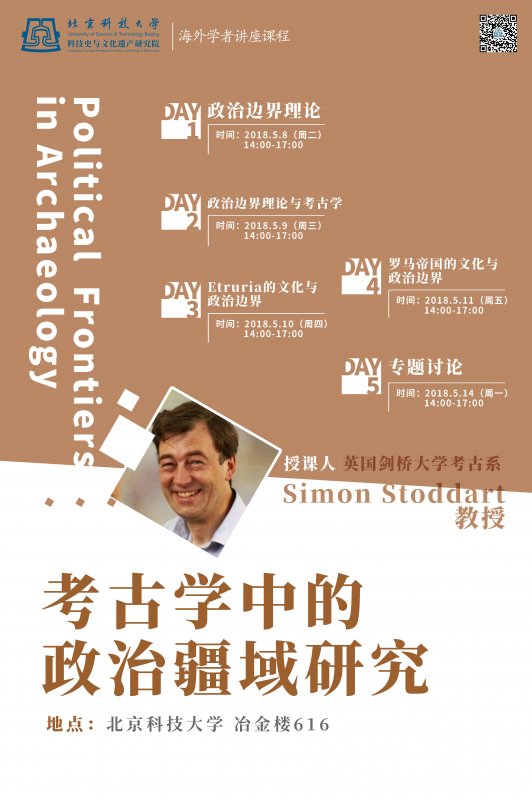剑桥大学Simon Stoddart 教授“考古学中的政治疆域研究”系列课程开课通知
时间: 2018-05-03 点击: 次
来源:本站原创 作者:科技史
系列讲座课程题目: Political Frontiers in Archaeology (考古学中的政治疆域研究)
授课人:Simon Stoddart 教授 (英国剑桥大学考古系)

时间:2018年5月8日—2018年5月14日(共五次) 地点:冶金楼616
教师简介: Simon Stoddart教授是地中海青铜与铁器时代社会复杂化研究的重要学者,先后毕业于英国剑桥大学(BA, PhD)和美国密西根大学(MA),曾在英国布里斯托大学、牛津大学、爱丁堡大学等从事教学和科研工作,现执教于剑桥大学考古系,并任麦克唐钠考古研究所代理副所长。Stoddart教授在地中海社会演进尤其是铁器时代国家政治疆域及其比较研究等领域成果丰硕,目前正主持欧盟研究理事会(ERC)研究项目,开展马耳他岛古代国家发展与环境的相互关系;Stoddart教授曾还曾长期担任著名刊物Antiquity副主编。
授课大纲:
Day 1, 2018.5.8(星期二), 下午2:00-5:00
第1讲:政治边界理论(1):定义与模型.概论.边界与边域.Marches.边疆. 重要参考文献: 1. Naum, M. 2010. Re-emerging Frontiers: Postcolonial Theory an dHistorical Archaeology of the Borderlands. Journal of Archaeological Methodand Theory 17: 101–31. 2. Donnan, H. & Wilson, T. M.1999. Borders: Frontiers of identity, nation and state. Oxford: Berg.
第2讲:政治边界理论(2):Turner的美洲边界理论 重要参考文献: 1. Turner, F. J. 1976. The frontier in American history. Huntington,N.Y.: R. E. Krieger Pub. Co. 2. Turner, F. J. 1893. The significance of the frontier in American History. Annual Report for the American Historical Association for the Year 1893 1893: 199-227.
第3讲:政治边界理论(3):Kopytoff的非洲边界理论 重要参考文献: Kopytoff, I. (ed.) 1989. The African frontier: the reproduction of traditional African societies Bloomington:Indiana University Press
Day 2,2018.5.9(星期三), 下午2:00-5:00
第4讲:政治边界理论(4):Di Cosmo的中国边界理论 重要参考文献: Di Cosmo, N. 2004. Ancient China and its enemies: the rise of nomadic power inEast Asian history / Nicola Di Cosmo. Cambridge: Cambridge University Press
第5讲:政治边界理论(5):Donnan和Wilson的北爱尔兰边界理论 重要参考文献: Wilson, T. M. & Donnan, H. 2006. The anthropology of Ireland. Oxford,UK; New York: Berg. 专题讨论:什么是边界?
第6讲:考古学:物质文化与建筑环境 重要参考文献: 1. Hodder, I. 1982. Symbols in Action: Ethnoarchaeological Studies of Material Culture. Cambridge:Cambridge University Press. 2.Lightfoot, K. G. & Martinez,A. 1995. Frontiers and boundaries in Archaeological perspective. Annual Review of Anthropology 24:471-92. 3.Green, S. W. & Perlman, S. M.(eds.). 1985. The archaeology of frontiers and boundaries. New York: Academic Press.
Day 3,2018.5.10(星期四), 下午2:00-5:00
阅读文献: 1. Redhouse, D. I. &Stoddart,S. K. F. 2011. Mapping Etruscan State formation. In Terrenato, N. & Haggis,D. (eds.), State formation in Italy and Greece. Questioning the Neoevolutionist paradigm. Oxford:Oxbow, 161-78. 2. Stoddart,S. K. F. 2010. Boundaries of the State in Time and Space: Transitions and Tipping Points. Social Evolution &History 9 (2 (September)): 28-52.
第7讲:Etruria的文化与政治边界(1)海洋边界.希腊、腓尼基与地中海. 重要参考文献: Camporeale,G. 2016. The Etruscans and the Mediterranean. In Bell, S. &Carpino, A.(eds.), A companion to the Etruscans. Chichester: John Wiley & Sons, 67-86
第8讲:Etruria的文化与政治边界(2)河流边界. Etruscans and Latins 重要参考文献: Patterson,H. &Coarelli, F. (eds.). 2008. Mercator Placidissimus– The Tiber Valleyin antiquity: New research in the upper and middle valley. Rome, 27-28 February 2004. Rome: Quasar. 文章选读
第9讲:Etruria的文化与政治边界(3):缓冲边界.Etruria的河流、湖与山丘 重要参考文献: 1. Edwards, C., Malone, C. &Stoddart, S. 1995. Reconstructing a gateway city: the place of Nepi in the study of south-eastern Etruria. In Christie, N. (ed.) Settlement and economy in Italy. 1500 BC - AD1500. Oxford: Oxbow Books, 431-40. 2. Cifani, G.,Ceccarelli, L. &Stoddart, S. K. F. 2012. Exploring a frontier area inEtruria: The Civita di Grotte di Castro survey. In Cifani, G., Stoddart, S. K.F. & Neil, S. (eds.), Landscape, ethnicity and identity in the Archaic Mediterranean area. Oxford: Oxbow,163-71. 3. Stoddart,S. in press. The Creation and maintenance of powerful places in Etruria. In Gyucha, A. & Salisbury, R. B. (eds.), What If We Build This Here? SpatialPatterns, Community Organization, and Identity at Nucleated Settlements. (IEMADistinguished Monograph Series). Buffalo: SUNY Press.
第10讲:Etruria的文化与政治边界(4)The expansive, but fuzzy frontier. Perugia and the Umbrians. 重要参考文献: 1. Stoddart, S. K. F., Baroni, M., Ceccarelli, L.,Cifani, G., Clackson, J., Ferrara, F., della Giovampaola, I., Fulminante, F.,Licence, T., Malone, C., Mattacchioni, L., Mullen, A., Nomi, F., Pettinelli, E., Redhouse, D. & Whitehead, N. 2012. Opening the Frontier: the Gubbio –Perugia frontier in the course of history. Papers of the British School atRome 80: 257-94. 2. Stoddart, S. &Redhouse, D. 2014. The Umbrians: Anarchaeological perspective. In Aberson, M.,Biella, M. C., Wullschleger, M. & Di Fazio, M. (eds.), Entre archéologieet histoire: dialogues sur divers peuples de l’Italiepréromaine. Genève: Université de Genève -Faculté des Lettres - Département des Sciences de l'Antiquité, 107-24.
Day 4,2018.5.11(星期五), 下午2:00-5:00
专题讨论:什么是Etruscan的边界?
第11讲:罗马帝国的文化与政治边界(1):中欧和北不列颠的防御疆域(安东尼墙和哈德良长城) 重要参考文献: 1.Sommer, C. S. 2015. At the Edge of the Roman Empire.Tours along the Limes in Southern Germany. In Matesic, S. &Sommer, C. S.(eds.), At the Edge of the Roman Empire. Tours along the Limes in Southern Germany. (Special Volume 3). Bad Homberg: Deutsches Limes Komission, 14-25. 2.(节选)Johnson, S. 1989. English Heritage book of Hadrian's Wall. London: Batsford/ English Heritage. 3.(节选)Breeze, D. J. 1993. The Northern frontiers of Roman Britain.London: Batsford. 4.(节选)Wells, P. (ed.) 2013. Rome Beyondits Frontiers: imports, attitudes and practices. Portsmouth (Rhode Island):Journal of Roman Archaeology.
第12讲:罗马帝国的文化与政治边界(2)非洲与近东的沙漠边疆 重要参考文献: 1.(节选)Mattingly, D. J. 1994. Tripolitania. Michigan: University of Michigan Press. 2.(节选)Kennedy, D. L. & Riley, D. N. 1990. Rome's desert frontier: from the air. London:Batsford. 3. Boozer, A. L. 2013. Frontiers and Borderlands in Imperial Perspectives:Exploring Rome's Egyptian Frontier. American Journal of Archaeology 117 (2): 275-92.
Day 5,2018.5.14(星期一), 下午2:00-5:00
专题讨论:What is a Roman frontier? 专题讨论:Discussion and Group presentations. 5个人一组,以一个疆界作为报告主题。可以使用亚洲本地文献资源。
备注: 1.全程英文授课。 2.本课程计入选修学分。 3.考核方式:结合讲座内容,以考古学文化疆域、边缘地带、物质文化交流等为主题进行小组报告。
|

